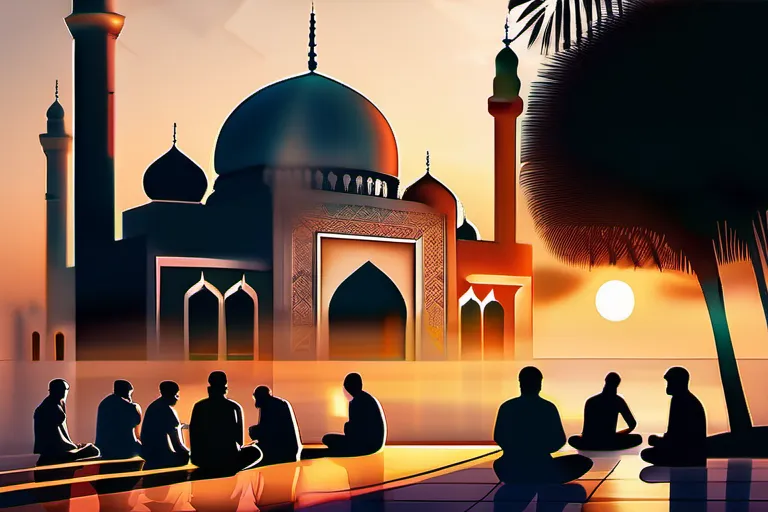Explore the fundamental beliefs, practices, and values that define Islam as the world’s fastest-growing religion.
Islam is the fastest-growing religion in the world today. With over 1.8 billion followers worldwide, it continues to expand its influence across continents. In this article, we delve into the key teachings of Islam that make it such a powerful and captivating faith.
The Five Pillars of Islam
Imagine standing at the edge of a vast ocean, where every wave represents a different religious belief. Among these waves, one stands out—the Five Pillars of Islam, which are like the pillars that support this vast and beautiful ocean of faith.
The Five Pillars serve as the bedrock upon which every Muslim builds their spiritual life. They are not just guidelines; they are the very foundation that holds the community together, much like the cornerstones of a sturdy house.
Let’s explore these pillars one by one, each more profound than the last:
- Shahada: This is the first pillar, the declaration of faith. It’s not just about saying ‘There is no god but Allah, and Muhammad is His messenger.’ It’s about fully understanding and embracing this belief in your heart, like planting a seed that will grow into a tree of faith.
- Salat: Praying five times a day is more than just ritual; it’s connecting with the divine through the power of words and actions. It’s like communicating with a friend who listens to your every need, offering solace and guidance in return.
- Zakat: Giving alms is not about wealth but about sharing what you have with those less fortunate. It’s like spreading sunshine across the land, ensuring that no one is left in darkness. This practice instills a sense of responsibility towards one’s community and the environment.
- Sawm: Fasting during Ramadan teaches self-control and empathy. It’s like going on a journey where you learn to walk in someone else’s shoes, understanding their struggles and joys. Each sunrise marks not just the end of a fast but a step towards greater compassion.
- Hajj: The pilgrimage to Mecca is an act of unity, bringing together Muslims from all corners of the globe. It’s like coming home after a long journey, symbolizing the universal brotherhood and sisterhood that binds every Muslim, no matter their origin or background.
Each pillar holds immense value, much like different facets of a diamond reflecting light in unique ways. Together, they form an unbreakable bond that keeps Muslims anchored in their faith, guiding them through life’s tumultuous waves.
The Six Articles of Faith
The Six Articles of Faith: Learn about the six fundamental beliefs that Muslims hold as true.
Imagine you’re standing at the threshold of a vast, open field. Each step you take reveals new insights into the heart of Islam. The first thing you encounter are the six articles of faith, like towering trees that shade and sustain this spiritual landscape.
Do these beliefs define who we are?
-
The belief in Allah: This is akin to recognizing the sun as the source of all light. Just as sunlight bathes the world, Allah’s presence permeates every aspect of life.
-
The belief in angels: These are like silent messengers, invisible but ever-present. They deliver messages from the divine and remind us that we are not alone on this journey.
-
The belief in holy books: Think of these as ancient maps guiding our way. From the Torah to the Gospel, each book offers a piece of the puzzle that is human understanding.
-
The belief in prophets: Just like how every child learns from their parents, Muslims believe in a lineage of messengers sent by Allah. Each prophet brought guidance and light, making it easier for us to navigate life’s challenges.
-
The belief in the Day of Judgment: Imagine standing before a great judge who has all knowledge of our deeds. This belief shapes our actions, ensuring we strive for righteousness every day.
-
The belief in predestination and free will: This is like walking along a path where you can choose your steps but know the destination is predetermined. It teaches us to accept what is meant for us while making conscious choices.
These six articles are the foundation of Islamic faith, much like the roots of a tree that anchor it firmly in the earth. They guide Muslims through life’s complexities, offering a sense of direction and purpose.
The Role of the Quran in Islam
The Quran, often referred to as the word of God, holds a paramount place in Islam. Imagine it as the heart that beats at the core of every Muslim’s life. This holy book is not just read; it’s lived. Each verse guides Muslims on how to lead their daily lives and interact with others. But what makes the Quran so significant? Why do over one billion people find solace and direction in its pages?
One key aspect lies in its divine origin, claimed by Muslims as the word of Allah revealed through the angel Gabriel to Prophet Muhammad. This revelation is believed to have begun during a night of meditation in a cave called Hira, much like a seed planted deep into fertile soil that promises abundant growth. The Quran’s message transcends time and culture, offering timeless wisdom on faith, morality, and ethics.
Furthermore, the structure of the Quran itself, with its beautifully crafted verses, serves as an example of eloquence and clarity. Each chapter or sura offers insights into various aspects of life, weaving a tapestry that covers every facet of human existence. The metaphorical language used in the Quran often serves as a bridge between the literal and the spiritual, inviting readers to ponder deeper meanings.
The role of the Quran extends beyond mere reading; it’s about internalizing its teachings and making them a part of one’s life. Each time you recite a verse or reflect on its meaning, you’re not just learning words but engaging with a profound source of guidance. The Quran is more than a text; it’s the heartbeat of Islam, guiding every aspect of Muslim life from personal conduct to communal duties.
From its recitation in prayers to its presence in homes and public spaces, the Quran remains an integral part of Islamic culture and daily practice. It serves as a constant reminder of the divine will and provides a framework for living a righteous and balanced life. In essence, understanding the significance of the Quran is crucial for grasping the core beliefs and practices that define Islam.
The Life of Prophet Muhammad
How did Islam come to be, and who was its founder? The life of Prophet Muhammad is a fascinating journey that laid the foundation for one of the world’s fastest-growing religions. Born around 570 CE in Mecca, he was known as ‘the one who was invoked,’ reflecting his early role in prayer and meditation.
As a young man, Prophet Muhammad faced many challenges. He witnessed the harsh treatment of the poor and the marginalized within society. His journey to understanding the true nature of existence began when he received revelations through the angel Gabriel. These revelations marked the beginning of his mission as a prophet.
The life of Prophet Muhammad is often compared to that of a beacon in the darkness, guiding people towards light and truth. His message was clear: there is only one God (Allah), and he called for unity, compassion, and social justice. Through his teachings, he aimed to build a society where every individual could find their place under the sun.
Prophet Muhammad’s life was marked by both challenges and victories. He faced opposition from powerful clans in Mecca who opposed his message of monotheism. Despite this, his followers grew steadily, and eventually, he made the historic journey to Medina with a small group of supporters, marking the beginning of Islam as a community.
During his life, Prophet Muhammad emphasized the importance of family, faith, and charity. He taught that true worship lies in actions that benefit others and that every person has the potential for goodness if they turn towards God.
The teachings of Prophet Muhammad continue to shape Islam today. His life serves as a model of humility, perseverance, and compassion. By exploring his journey, we gain insights into the fundamental beliefs, practices, and values that define Islam as one of the world’s fastest-growing religions.
Islamic Law (Shariah) and its Principles
Imagine living your life according to a set of principles that are both deeply personal and universally applicable. That’s what Shariah, or Islamic law, offers to Muslims around the world. Shariah guides believers on how to worship Allah, conduct their daily lives, and interact with others in society.
At its core, Shariah is not just a set of rules but a comprehensive system that aims to ensure justice, mercy, and harmony in every aspect of life. Think of it as the compass for Muslims navigating through the complexities of their everyday existence. It covers everything from rituals like prayer and fasting to more mundane aspects such as business transactions and family relationships.
The principles of Shariah are derived from the Quran, the holy book of Islam, and the teachings of the Prophet Muhammad, whose life serves as a model for Muslims. These teachings emphasize justice, honesty, and compassion. For example, the concept of halal (permissible) and haram (forbidden) dictates what is acceptable in terms of food, clothing, and behavior.
One fascinating aspect of Shariah is its adaptability. While it provides a solid framework, its application can vary based on the context and cultural norms of different regions. This flexibility allows Muslims to navigate through diverse environments while maintaining their faith’s core values. It’s like having a map that guides you in unfamiliar territories, ensuring that your journey remains true to your destination.
By following Shariah, Muslims aim to live a life of integrity and piety, striving not only for personal salvation but also for the betterment of their communities. This legal system is more than just a set of rules; it’s a way of life that fosters a sense of responsibility towards both individual growth and societal well-being.
As we move forward to explore how Islam has shaped society, remember that Shariah plays a pivotal role in this process. It provides the foundational principles that Muslims apply in their daily lives, impacting everything from governance and education to healthcare and social justice. Understanding Shariah is key to grasping the profound influence of Islam on the world today.
The Impact of Islam on Society and Culture
The impact of Islam on society and culture is vast and profound, shaping the fabric of life in countless ways across the Muslim world. Have you ever wondered how this religion has influenced the way people live, dress, and think? Imagine a garden where every plant and flower contributes to its beauty; in much the same way, each aspect of Islamic culture plays a role in enhancing the overall landscape.
One of the most visible impacts is in the realm of architecture. Mosques, with their grand domes and intricate calligraphy, stand as testaments to the faith’s influence on art and design. These magnificent structures not only serve as places of worship but also become centers of community life, where people gather for prayers, education, and social interaction. How does it feel to step into a mosque adorned with verses from the Quran, feeling the weight of centuries of history and devotion?
Islamic art, often misunderstood as merely decorative, is rich in meaning and symbolism. From geometric patterns that represent the infinite nature of God’s creation to calligraphy that adorns every surface, each element tells a story. It’s like walking through a vast library where every page contains wisdom and beauty. What do you think it means when intricate designs cover the walls and ceilings of mosques, telling stories without words?
Moreover, Islamic customs have deeply influenced daily life. For example, Ramadan, the month of fasting, is not just about abstaining from food and drink but also about reflecting on one’s actions and strengthening bonds with family and community. How does it feel to break your fast at sunset with friends and family, sharing stories and breaking bread together? This practice fosters a sense of unity and shared purpose that transcends individual differences.
These are just a few examples of how Islam has shaped society and culture. The impact extends far beyond these visible aspects into the very fabric of Muslim communities worldwide. Each tradition, custom, and piece of art contributes to a vibrant tapestry that reflects the diversity and richness of Islamic heritage.
Conclusion
 Islam’s teachings emphasize peace, compassion, and unity among people. By understanding these core principles, one can appreciate the profound impact Islam has had on millions of lives around the globe.
Islam’s teachings emphasize peace, compassion, and unity among people. By understanding these core principles, one can appreciate the profound impact Islam has had on millions of lives around the globe.











